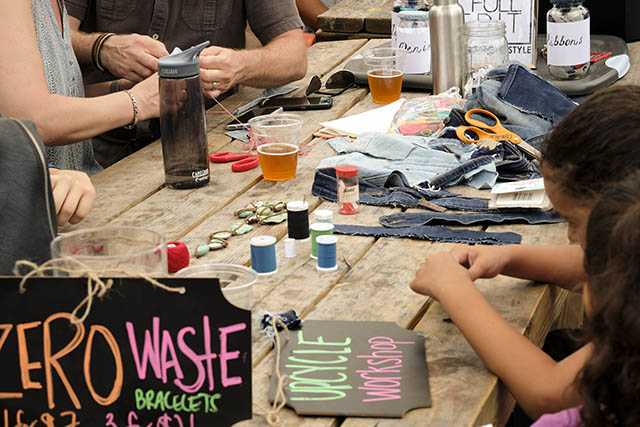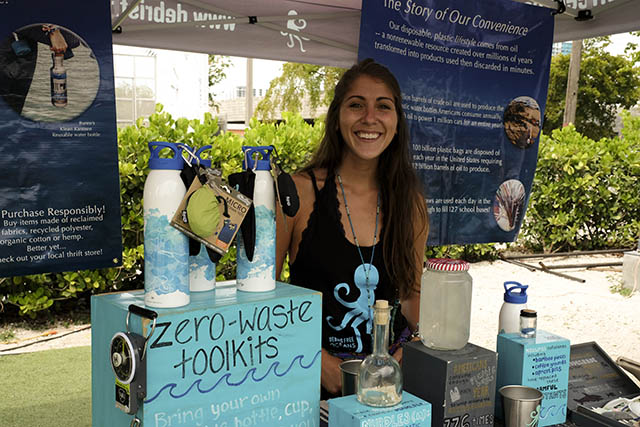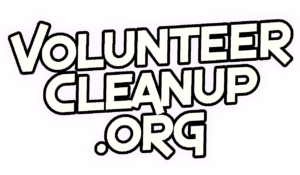
This year, things are a bit different.
In years past, we have celebrated Earth Day with a huge festival at The Wynwood Yard, complete with live music, informative panels, booths, community clean-ups, local beer tastings, and interactive, educational events.
We aren’t gathering on the lawn, jamming to music by Keith Johns.
We aren’t cleaning up beaches or city streets with Volunteer Clean-Up or Debris Free Oceans.
We aren’t sitting together at communal tables learning how to make upcycled bracelets with Colleen of The Full Edit or how to make herbal tinctures with Mother Earth Miami.
We aren’t gardening together with Little River Cooperative and we aren’t learning how to cook with Pamela Wasabi or Miami Smokers this year.

Get a glimpse into our Earth Day history here.
But that doesn’t mean we don’t celebrate Earth Day together as a community, or take this opportunity to learn more or get active for our Mother Earth.
We asked for perspectives on Earth Day 2020 from some of The Doral Yard’s sustainability partners. We asked some of our local key partners in environmental action for their thoughts on this very different Earth Day 2020, and how we can honor our earth in a new way this year. Now, read on to get their key insights into this moment in time, Earth Day 2020.
Is the current situation really all rainbows and butterflies for the environment, as we are seeing in many media outlets, or are there hidden dangers and underlying concerns to be aware of?
Dara Schoenwald
Executive Director for VolunteerCleanup.org
Clearly, there has been a reduction on carbon emissions and air pollution, and improvement in air quality as a result of less cars on the road, less factories, and less airline travel. This has been documented in India, with rare views of the Himalayas.
 But on the other hand, there has been an increase in single-use plastics, as places with prior plastic bags bans have now temporarily prohibited reusable bags, cafes prohibiting bring-your-own cups, and a surge in disposable items like masks, gloves, and wipes.
But on the other hand, there has been an increase in single-use plastics, as places with prior plastic bags bans have now temporarily prohibited reusable bags, cafes prohibiting bring-your-own cups, and a surge in disposable items like masks, gloves, and wipes.
Food shopping trends are changing, too. I’ve noticed people concerned about buying only packaged foods or bagged produce that can easily be wiped down. This is understandable to some extent, but still bad for the environment.
On the positive side, anecdotally, there have been some reports of improved water quality, or at least the appearance of.
Collin Schladweiler
Outreach Coordinator for Miami Waterkeeper
 Miami Waterkeeper does believe this slowdown due to COVID-19 has been a silver lining for some of our water resources. During this time of low boat traffic and water recreation on local beaches, the water has been clearer and bluer. It’s also been a time of little rain, which means that we haven’t had so much polluted runoff from land into the water, like stormwater and fertilizers.
Miami Waterkeeper does believe this slowdown due to COVID-19 has been a silver lining for some of our water resources. During this time of low boat traffic and water recreation on local beaches, the water has been clearer and bluer. It’s also been a time of little rain, which means that we haven’t had so much polluted runoff from land into the water, like stormwater and fertilizers.
While people are home, they are connecting to nature around them that they might not normally notice. If you’re lucky enough to have a water view or to safely walk along the water, you could take this opportunity to keep your eyes on the water to report rare and protected marine life.
We can also be on the lookout for marine debris that is now visible due to clearer water and report it to have it removed. The environment certainly seems to be rebounding!
Let’s continue to keep on top of the pollution issues we see!
Seth Bloomgarden
Chairman for Surfrider Foundation Miami
 The Coronavirus shutdown may have had some unanticipated benefits for our environment. It’s been an interesting phenomenon. With less human influence, our waters seem to be returning to a more natural state.
The Coronavirus shutdown may have had some unanticipated benefits for our environment. It’s been an interesting phenomenon. With less human influence, our waters seem to be returning to a more natural state.
With no crowds at the beaches – there is significantly less single-use-plastic waste directly polluting our shoreline and entering the ocean
People have been seeing more marine life in our waters.
Less driving and flying have also had the incredible benefit of less carbon being emitted into our atmosphere, which not only affects the ocean but our overall environment
With no one going to the beach, and few boaters out, the ocean has been able to take a brief pause and begin to re-set itself
But even though the water may look clearer… we still need to do scientific tests to see if it’s only the appearance of the water, or if it is actually cleaner after this quarantine.
What are the possible long term positive consequences to this global quarantine?
Caiti Waks
Co-Founder, Board Director for Debris Free Oceans
 We, as a community, can determine whether we want the outcome of this global quarantine to be positive or not. Of course, there has been a detrimental impact on human life, and this causes all of us great pain, and we should always remember the heroes helping to combat this pandemic and the lives lost during this time.
We, as a community, can determine whether we want the outcome of this global quarantine to be positive or not. Of course, there has been a detrimental impact on human life, and this causes all of us great pain, and we should always remember the heroes helping to combat this pandemic and the lives lost during this time.
However, once we come out of the pandemic, I believe we can recreate our world for the better.
Although confined to our homes, this pandemic has permitted us time to reflect on our society and environment like we never have before. Everything has come to a pause, and we are able to assess what systems are working and what may need adjustment to ensure a healthier and more equitable future for all.
As time progresses, I hope we begin having more thoughtful discussions on how to consciously move forward post-COVID so we can harmoniously balance the environment and economy to the benefit of all beings on Earth.
Collin Schladweiler
Things may go back to the status quo after the quarantine is over, but this moment in time is like an environmental experiment no one would have been able to conduct.
We must continue to spread the message about the connection between the land and the water to everyone, showing that when we do reduce our carbon emissions, our pollution input to local water bodies, and the amount of pressure put on marine animals, then our waterways show resilience and an ability to bounce back!
This time should be used as a wake-up call.
Dara Schoenwald
I am hopeful that one of the long term positive outcomes will be the recognition of the effectiveness of working remotely/working-at-home policies.
With a previous career in an international technology company where we often worked with geographically distributed teams, I’ve often used online collaboration tools, so it’s nice to see other businesses recognizing that you can still work productively even if everyone isn’t co-located. This bodes well for carbon emission and climate change associated with too many cars on the road.
Seth Bloomgarden
This has been a major wake up call for many. People are beginning to more fully understand that we cannot take anything for granted! Our health, our loved ones, and our community, as well as our environment… are all connected.
Sometimes we forget that we live in a tropical paradise. Miami is uniquely beautiful.
Not being able to enjoy the beaches, coastlines, and waves that we may have taken for granted in better times only reinforces how precious these resources are and the need for us all to double down on our efforts to protect them. I’m hopeful this will happen if we all do our part.
Are we in a period of environmental enlightenment? Or, is the opposite true? Are we going backward in terms of conservation, returning to a single-use-plastic dependence?
Dara Schoenwald
I fear that this is going to be very detrimental for the single-use plastic movement, and we may experience a short-term backlash against the recent positive forward momentum we have made on the issue.
Perhaps people are going to be more concerned about germs from using things that have been used by others. Maybe they are going to want more straws with their drinks or prefer disposables.
That is the unfortunate truth, and I hope it subsides after more viable treatments or vaccines are available.
Seth Bloomgarden
It is a bit of a mixed bag here. Many in our community are really waking up and more fully realizing the importance of protecting our environment.
However, sadly, I still see a lot of people going into panic buying mode, needlessly purchasing cases of single-use plastic water bottles and other disposable plastic items.
I see people disposing of their used gloves and masks on the street and not disposing of these items properly.
We need to continue to educate and inform people that when you throw something “away” or put it down your drain – there really is no “away.” Most of this waste or these chemicals end up sticking around in the environment or our waterways and in one way or another, disrupting our wildlife.
What are your thoughts on the use of single-use plastic gloves during COVID-19?
Caiti Waks
Please do not take these gloves off and toss them onto the ground. Not only is this environmentally destructive, but it is rude and inconsiderate to everyone else struggling to keep themselves healthy.
In essence, an individual is saying “I don’t care if you come into contact with this potentially contaminated surface” whenever you throw a glove into a common space. It goes against all of our efforts of social distancing–to help protect each other –if you are simply going to dispose of your potentially contaminated surface into the public sphere where anyone may come into contact with it.
Second, you can avoid using single-use gloves. I have a few pairs of reusable gloves that I use when interacting with potentially contaminated surfaces. Then, I remove them and place in the sun at my home; and after a couple of days, I put them in the washing machine to disinfect them.
This is a sustainable alternative to disposable gloves.
Dara Schoenwald
There is definitely a surge in disposable items like masks and gloves, wipes, etc which have been found ALL over the place (#theglovechallenge) It’s unacceptable to me that people wishing to protect themselves with gloves, would then also harm others and the environment by leaving those potentially contaminated gloves all over the place.
Learn more about what we can do this Earth Day to celebrate, learn about and honor our Mother Earth.
Also join us tomorrow, Wednesday, 4/22, for a special Earth Day cooking class with The Doral Yard’s Julie Frans. Tickets and more info here.